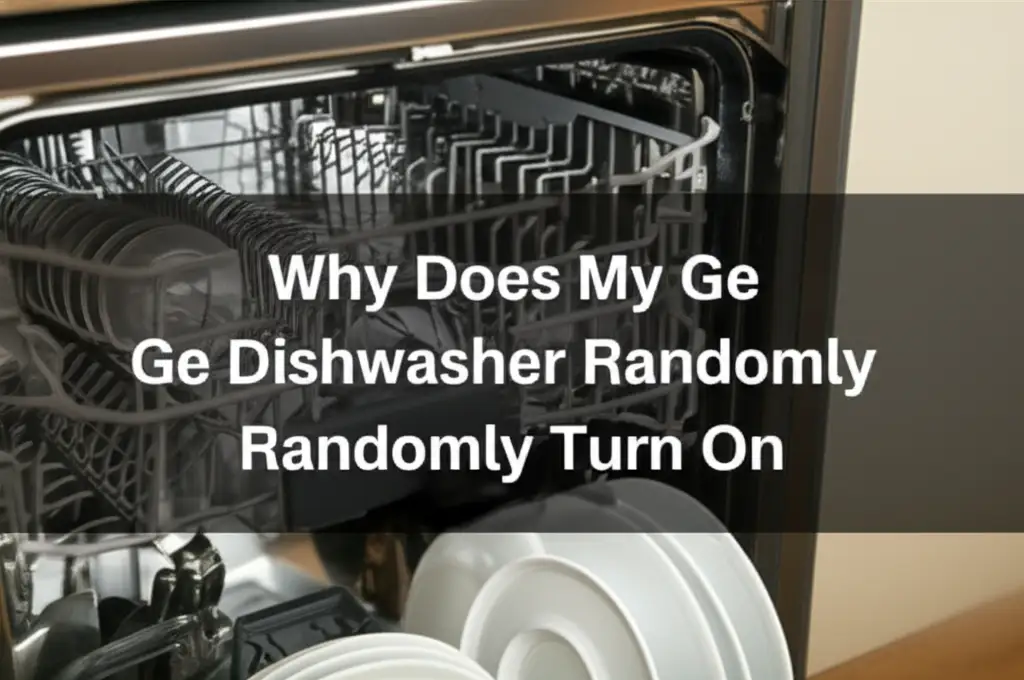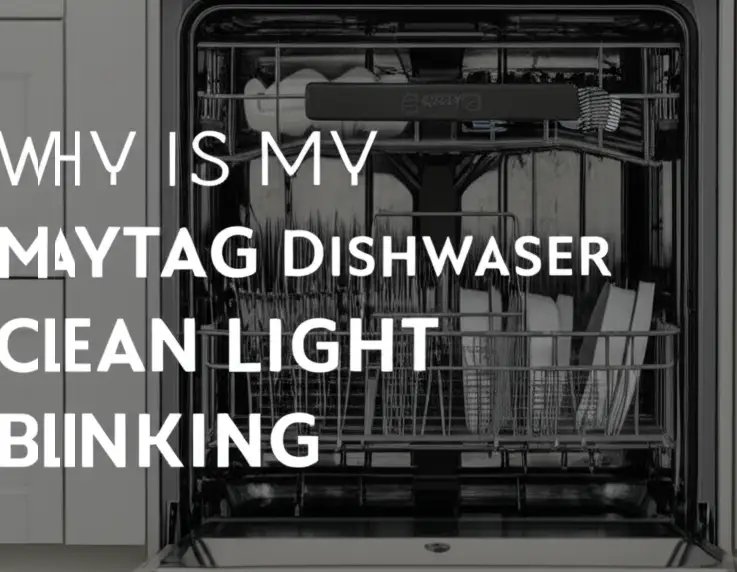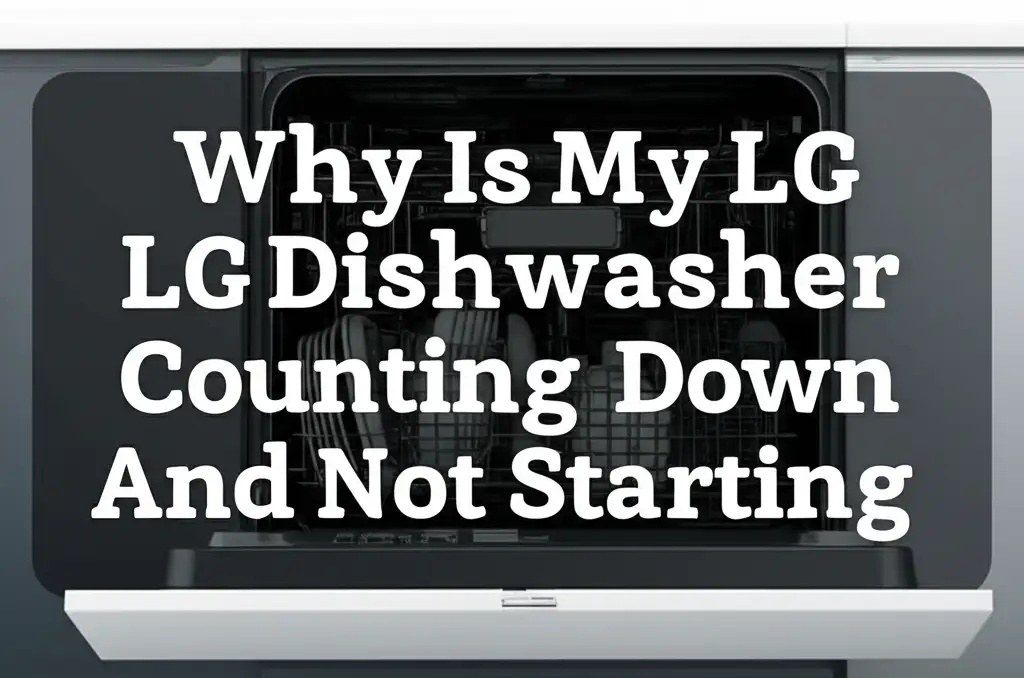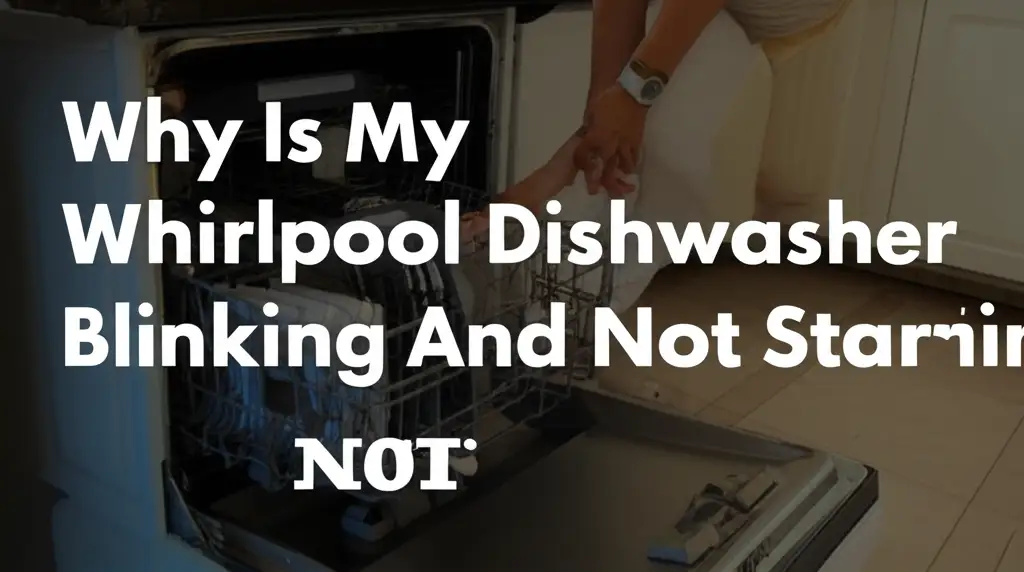· Todd Martin · Appliance Troubleshooting · 18 min read
Why Does My Ge Dishwasher Randomly Turn On

GE Dishwasher Randomly Turns On? Here’s Why!
Imagine this: you are relaxing at home, and suddenly, your GE dishwasher whirs to life. No one touched it. It just turned on by itself. This surprising event can be confusing and a little concerning. When your GE dishwasher randomly turns on, it often signals an underlying issue. This problem is more common than you might think. It can stem from various components within the appliance.
I know how frustrating a rogue appliance can be. This article explores the common reasons your GE dishwasher might activate unexpectedly. We will look at possible electrical issues, component failures, and control glitches. You will learn how to diagnose these problems. We will also cover practical steps you can take to fix them. My goal is to help you restore peace and proper function to your kitchen.
Takeaway
- Check power supply: Unplug and re-plug your dishwasher. Test the wall outlet.
- Inspect the control panel: Look for stuck or faulty buttons. Clean the panel carefully.
- Examine the door latch: Ensure it latches correctly. Test the door switch for continuity.
- Consider the main control board: A failing board sends wrong signals. This often requires professional diagnosis.
- Look for water leaks: Leaks can short out components, causing erratic behavior.
- Review your settings: Disable features like delay start or sanitization options.
Why Does My GE Dishwasher Randomly Turn On?
A GE dishwasher randomly turns on due to electrical problems or component failures. Common culprits include a faulty control board, a damaged touchpad or control panel, a malfunctioning door latch switch, or issues with the water inlet valve or drain pump. Power surges or loose wiring can also trigger unexpected cycles.
Understanding Your GE Dishwasher’s Control Panel
The control panel serves as the brain of your GE dishwasher. It processes all your commands. When you press a button, the panel sends a signal to the appropriate component. A malfunctioning control panel can misinterpret signals or send phantom ones. This leads to your GE dishwasher randomly turning on. Problems often arise from moisture damage or general wear and tear.
Over time, moisture can seep into the panel. This corrodes the delicate electronic circuits. Even small spills can cause this damage. Sometimes, a button might get stuck in the “on” position. This sends a continuous signal to the dishwasher. You might not even see it stuck. The button could be internally jammed. A stuck button makes the dishwasher start on its own.
My advice is to visually inspect the control panel. Look for any visible damage or signs of moisture. Check if any buttons feel different when pressed. They might feel spongy or stick. A dirty panel can also cause issues. Dust or grease can accumulate around buttons. This interferes with their proper function.
- Clean the Panel: Gently wipe down the control panel with a soft, damp cloth. Use mild soap if needed. Ensure no moisture gets into the gaps. Let it air dry completely before testing.
- Check for Stuck Buttons: Press each button firmly. Ensure it springs back properly. If a button feels stuck, try to gently dislodge it. Do not force it, as you might cause more damage.
- Reset the Dishwasher: Sometimes a simple reset clears minor glitches. Turn off power to the dishwasher at the circuit breaker for a few minutes. Then restore power. This can clear temporary electronic errors.
If you suspect internal damage, calling a qualified technician is wise. They have the tools to diagnose control panel issues safely. They can determine if you need a new panel or just a repair. This step is important for fixing a GE dishwasher that randomly starts.
Identifying Issues with the Touchpad and User Interface
The touchpad and user interface are crucial for operating your GE dishwasher. They allow you to select cycles and options. If your GE dishwasher randomly turns on, the touchpad might be at fault. Touchpads can develop internal shorts or become overly sensitive. This makes them register commands without any human interaction.
I have seen many cases where a faulty touchpad causes phantom button presses. These presses can initiate cycles or other functions. Water or cleaning solutions can seep under the touchpad surface. This causes corrosion or short circuits. Extreme temperature changes might also damage the touchpad’s sensitive electronics. Age is another factor. Over time, the internal layers of the touchpad can degrade.
Sometimes, the issue is not with the touchpad itself, but with its connection to the main control board. A loose ribbon cable can cause intermittent signals. These signals make the dishwasher behave erratically. It might seem like the dishwasher has a mind of its own.
- Visual Inspection: Look closely at the touchpad surface. Are there any cracks, bubbles, or peeling areas? These could indicate internal damage.
- Test Responsiveness: Press each button on the touchpad. Do they all respond consistently? Inconsistent responses point to a failing touchpad. If some areas are unresponsive while others trigger random actions, the touchpad is likely the problem.
- Isolate the Power: Before doing any work, always disconnect power to your dishwasher. This keeps you safe from electrical shocks. Turn off the circuit breaker for your kitchen or the specific dishwasher circuit.
Replacing a touchpad often requires disassembling the dishwasher door. This can be a complex task. If you are not comfortable with appliance repair, seek professional help. A technician can safely replace the touchpad. This often solves the problem of a GE dishwasher that randomly turns on. For other common GE dishwasher power problems, you might find this article helpful: Why Does My GE Dishwasher Not Have Power?.
Examining the Door Latch and Door Switch Assembly
The door latch and door switch assembly are vital safety components in your GE dishwasher. They ensure the dishwasher only runs when the door is securely closed. If your GE dishwasher randomly turns on, a faulty latch or switch can be a primary cause. The dishwasher might incorrectly sense the door is open, then closed again, triggering a cycle.
I have come across situations where a door switch malfunctions. This sends incorrect signals to the control board. The board then thinks someone opened and closed the door. This can prompt the dishwasher to start a new cycle. The latch mechanism might also be loose or broken. A loose latch prevents the door from fully engaging the switch. This leads to intermittent contact.
Over time, constant opening and closing wears down the latch and switch. Debris or food particles can also get trapped in the mechanism. This prevents proper closure. You might notice the door feels loose or does not click into place. This is a clear sign of a problem.
- Inspect the Latch: Look at the physical latch mechanism on the door. Is it bent, broken, or misaligned? Check the strike plate on the dishwasher frame. Ensure it is not damaged.
- Check Door Alignment: Open and close the dishwasher door several times. Does it close smoothly and securely? If it wiggles or feels loose, the door might be misaligned. Misalignment prevents proper engagement with the switch.
- Test the Door Switch: The door switch is usually located inside the dishwasher, near the latch. You will need a multimeter to test for continuity. With power disconnected, remove the inner door panel to access the switch. In most cases, the switch should show continuity when the door is closed and no continuity when open. If it shows continuous continuity, it is stuck closed. If it shows no continuity at all, it is likely broken.
Repairing or replacing the door latch and switch can be a straightforward fix. However, it requires careful disassembly of the dishwasher door. If you are unsure, a professional can safely perform this repair. Ensuring the door system works correctly is key to preventing your GE dishwasher from randomly turning on.
Investigating the Main Control Board (Electronic Control Board)
The main control board, also known as the electronic control board (ECB), is the central processing unit of your GE dishwasher. It manages every function. If your GE dishwasher randomly turns on, a failing main control board is a strong suspect. This board interprets all signals from components. It then sends commands to motors, valves, and heating elements.
I consider the control board the “brain” of the dishwasher. When it malfunctions, it can send erroneous commands. This includes initiating a wash cycle without input. Power surges, age, and internal component failures can damage the board. You might see other strange behaviors as well. For example, cycles might not complete or buttons may not respond correctly.
Diagnosing a faulty control board is challenging. You cannot easily “see” the problem. The board’s internal circuits are complex. A visual inspection might show burn marks or swollen capacitors. However, many failures are not visible. A control board issue is often suspected after ruling out simpler causes.
Symptoms of a Failing Board:
- Random Operations: Dishwasher starts or changes cycles unexpectedly.
- Unresponsive Controls: Buttons do not work, or lights flash erratically.
- Partial Functions: Only certain parts of a cycle complete.
- No Power: In some severe cases, the dishwasher may not power on at all. This is a more generalized power issue. You can read more about it here: Why Does My GE Dishwasher Have Power But Will Not Start?.
Reset the Dishwasher: As a first step, always try a hard reset. Disconnect power to the dishwasher at the circuit breaker for 5-10 minutes. This can sometimes clear minor glitches.
Professional Diagnosis: If resetting does not work, a professional technician should inspect the control board. They have diagnostic tools. They can test voltage and continuity at various points. Replacing a main control board is usually an expensive repair. It often requires specific programming for your model. It is not a DIY task for most homeowners.
A technician can confirm if the control board is the true cause. They can then advise on repair or replacement options. This is a critical step for serious issues like a GE dishwasher randomly turning on.
Addressing Power Supply and Electrical Irregularities
Electrical issues are a frequent cause of appliances behaving strangely. If your GE dishwasher randomly turns on, power supply irregularities could be the culprit. This includes power surges, voltage fluctuations, or even loose wiring. A sudden spike or dip in electricity can confuse the dishwasher’s electronics.
I have observed that even minor power glitches can trigger internal safeguards or restart cycles. When power returns after an interruption, the dishwasher’s control board might interpret it as a command. It then starts a new cycle. Loose connections behind the dishwasher or at the circuit breaker can also lead to intermittent power. This makes the dishwasher power on and off erratically. This often mimics random starts.
Sometimes, the electrical outlet itself is the problem. A faulty outlet provides inconsistent power. This confuses the appliance. Older wiring in your home can also be insufficient. It might not handle the dishwasher’s power demands consistently. This leads to fluctuations.
- Check the Power Outlet: Unplug the dishwasher. Plug in another appliance like a lamp or hairdryer into the same outlet. See if that appliance receives consistent power. If not, the outlet itself may be faulty. You might need an electrician to inspect or replace the outlet.
- Examine the Power Cord: Inspect the dishwasher’s power cord for any visible damage. Look for frayed wires, cuts, or burn marks. A damaged cord needs immediate replacement.
- Inspect Wiring Connections: If you are comfortable and have disconnected power, check the wiring connections at the back of the dishwasher. Ensure they are secure. Loose wire nuts or terminals can cause intermittent power issues. Always ensure power is off at the breaker before touching any wiring.
- Surge Protector: Consider plugging your dishwasher into a high-quality surge protector. This protects it from sudden voltage spikes. While it might not fix an existing problem, it can prevent future damage from power irregularities.
For persistent electrical issues, consulting a licensed electrician is crucial. They can diagnose problems with your home’s wiring or circuit breaker. They ensure your dishwasher receives stable power. This step can prevent your GE dishwasher from randomly turning on due to electrical instability. For general knowledge about appliances turning off randomly, you might want to review this article: Why Does My Gas Oven Shut Off Randomly?.
Understanding Diagnostic Cycles and Software Glitches
Modern GE dishwashers are complex appliances with advanced electronics. They sometimes run diagnostic cycles or experience software glitches. If your GE dishwasher randomly turns on, it might be due to one of these factors. These are often less about a broken part and more about the dishwasher’s internal programming.
I find that diagnostic cycles can be puzzling to homeowners. These are self-tests the dishwasher performs. They check various components for functionality. Sometimes, these cycles can activate unexpectedly. This happens after a power outage or a perceived internal error. The dishwasher is just trying to fix itself.
Software glitches are another common issue. Like any computer, the dishwasher’s control board runs on firmware. This software can sometimes encounter bugs. These bugs cause erratic behavior. The dishwasher might misinterpret signals or execute commands it shouldn’t. This includes starting cycles at odd times.
- Identify Diagnostic Modes: Check your dishwasher’s user manual. Some models have specific sequences of lights or beeps that indicate a diagnostic mode. Familiarize yourself with these. This helps you determine if the “random start” is actually a planned self-test.
- Firmware Updates: For some advanced GE models, firmware updates might be available. These updates can resolve known software bugs. Contact GE customer support or visit their website for information specific to your model. This is less common for dishwashers compared to smart home devices, but it is worth checking.
- Perform a Hard Reset: As mentioned before, disconnecting power for several minutes can clear temporary software errors. It forces the control board to reboot. This often resolves minor glitches.
- Look for Error Codes: When your dishwasher acts strangely, it might display an error code. Check the display panel. Refer to your user manual to understand what the code means. Error codes often point to specific component failures or software issues.
If your GE dishwasher continues to turn on randomly after these checks, a deeper software or control board problem might exist. While some diagnostic cycles are normal, frequent random starts are not. If you rule out physical component failure, a professional technician can diagnose software-related issues. They may be able to reset or re-flash the control board’s firmware. This ensures your dishwasher is not just running an unnoticed diagnostic test or suffering from a bug.
Water Leaks and Moisture Damage Effects
Water and electronics do not mix. If your GE dishwasher randomly turns on, internal water leaks or moisture damage could be the cause. Even small amounts of water can bridge electrical circuits. This causes components to short out or send incorrect signals to the control board.
I have seen cases where a tiny drip from a hose or a pump causes big problems. Water can drip onto sensitive wiring or the main control board. This creates a short circuit. The short circuit mimics a button press or a command to start a cycle. This makes the dishwasher appear to activate by itself. Over time, moisture also leads to corrosion on electrical contacts. Corrosion increases resistance and can cause erratic behavior.
Common sources of leaks include:
Door gasket: A worn or damaged door seal can allow water to escape.
Hoses: Inlet or drain hoses can crack or become loose.
Pump seal: The seal around the wash pump or drain pump can fail.
Tub cracks: Though less common, cracks in the dishwasher tub can lead to leaks.
Inspect for Visible Leaks: Look under and around the dishwasher. Check for puddles or water stains on the floor. Open the dishwasher door and inspect the door gasket for tears or gaps.
Check Inside the Base: Some dishwashers have a drip pan at the bottom. This pan collects water from leaks. If it fills, it can activate a float switch. This switch sometimes signals problems or even tries to engage the drain pump. Accessing this area often requires pulling the dishwasher out.
Examine Wiring and Connections: With the power off, carefully inspect any visible wiring harnesses. Look for signs of water exposure, corrosion, or discoloration. If you see this, do not attempt to clean it yourself. Water damage on electrical components is dangerous.
Addressing leaks promptly is crucial. Ignoring them can lead to extensive damage not just to the dishwasher but also to your flooring. If you discover a leak, try to identify its source. Tighten loose connections or replace damaged hoses. If the leak is internal and affects electronics, professional help is required. Water damage can make electrical components unreliable and unsafe. For leaks from the bottom, you might want to consult this guide: Why Is My GE Dishwasher Leaking from the Bottom?.
When to Call a Professional Appliance Technician
While many GE dishwasher issues have DIY solutions, some problems require expert attention. If your GE dishwasher randomly turns on, and you cannot identify or safely fix the cause, it is time to call a professional appliance technician. Attempting complex repairs without proper knowledge or tools can be dangerous. It can also cause further damage to your appliance.
I always recommend professional help for tasks involving internal electrical components or significant disassembly. Faulty wiring, a failing main control board, or persistent water leaks fall into this category. Technicians have specialized diagnostic tools. They can pinpoint the exact problem quickly and safely. They also carry genuine replacement parts. This ensures the repair lasts.
Consider these situations for professional intervention:
- Electrical Concerns: If you suspect an issue with the main control board, internal wiring, or power supply to the unit. Tampering with these components carries a risk of electric shock.
- Persistent Problem: You have tried all troubleshooting steps, including power resets and visual checks, but the random turning on continues. This indicates a deeper, more complex issue.
- Unfamiliar with Appliance Repair: If you are not comfortable taking apart your dishwasher or working with electrical components. Safety should always be your top priority.
- Specialized Tools Required: Some diagnostics or repairs need specific tools, like a multimeter for continuity tests or specialized wrenches.
- Warranty Concerns: If your GE dishwasher is still under warranty, attempting DIY repairs might void it. Check your warranty terms before starting any work yourself.
A qualified technician provides an accurate diagnosis. They offer a reliable solution. They also ensure the repair meets safety standards. While there is a cost involved, it protects your investment. It also gives you peace of mind. They can resolve the issue of your GE dishwasher randomly turning on.
FAQ Section
Q1: Can a power outage cause my GE dishwasher to randomly turn on?
Yes, a power outage can sometimes cause your GE dishwasher to turn on randomly. When power is restored after an interruption, the control board might initiate a self-diagnostic cycle. It might also attempt to resume a previously interrupted cycle. This behavior is usually temporary. A hard reset by unplugging the dishwasher for a few minutes can often resolve it.
Q2: Is it safe to use my GE dishwasher if it turns on by itself?
It is generally not safe to use a GE dishwasher that randomly turns on. This behavior indicates an underlying electrical or component issue. Continuing to use it could worsen the problem. It might also pose a safety risk, such as an electrical short or fire hazard. It is best to disconnect power and diagnose the problem before further use.
Q3: How do I reset my GE dishwasher to stop random starts?
To reset your GE dishwasher, first locate its circuit breaker in your home’s electrical panel. Turn the breaker off for the dishwasher for at least 5 to 10 minutes. Then, turn the breaker back on. This hard reset can clear temporary electronic glitches that cause random starts. You can also unplug the dishwasher if it is easily accessible.
Q4: Can a stuck button on the control panel cause a random start?
Yes, a stuck or faulty button on the control panel can definitely cause your GE dishwasher to randomly turn on. The stuck button constantly sends a signal to the control board, telling the dishwasher to start. Even if you cannot see the button physically depressed, it might be internally jammed or faulty. Inspect and clean the buttons thoroughly.
Q5: What is the most common reason a GE dishwasher turns on by itself?
The most common reason a GE dishwasher turns on by itself is often a faulty control board or a malfunctioning touchpad/user interface. These components directly manage the dishwasher’s operations. When they fail, they can send erroneous signals, tricking the dishwasher into starting a cycle without user input. Power fluctuations are also a frequent culprit.
Q6: Can a GE dishwasher’s random start be related to water leakage?
Yes, a GE dishwasher’s random start can be related to water leakage. Water leaks, even small ones, can drip onto sensitive electrical components or wiring. This causes short circuits. These shorts can then trigger the control board to activate the dishwasher unexpectedly. Always inspect for leaks if your dishwasher acts erratically.
Conclusion
A GE dishwasher that randomly turns on is more than just an annoyance. It often points to a specific underlying issue. We have explored the most common causes, from faulty control panels and touchpads to issues with the door latch, main control board, and power supply. Understanding these potential problems helps you approach the diagnosis systematically.
My experience tells me that patience and careful observation are key. Start with the simplest checks like power resets and visual inspections. This can often resolve minor glitches. For more complex issues, especially those involving internal electrical components or significant disassembly, please call a qualified technician. Prioritizing safety is paramount. Addressing the problem quickly ensures your GE dishwasher returns to normal, reliable operation. You will again have a quiet kitchen, free from unexpected appliance noise.
- GE Dishwasher
- Dishwasher Repair
- Appliance Issues
- Troubleshooting Guide
- Random Start





